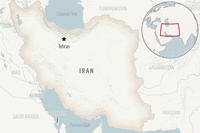Iraq's Shia leaders condemned the Sunni community Tuesday in strident outbursts that appeared to also reject President Obama's terms for offering U.S. military assistance against Islamic extremists.
Obama had called on Iraqi Prime Minister Nouri al-Maliki to reach out to the Sunnis before the U.S. would exercise military options including airstrikes on the militants of the Islamic State of Iraq and Syria.
However, Maliki announced a crackdown on Sunni politicians and military officers he considers "traitors." He said his Shia coalition would not negotiate with the Sunni bloc in parliament. The Baghdad government also charged that Saudi Arabia was backing ISIS.
"We hold them responsible for supporting these groups financially and morally, and for the outcome of that, which includes crimes that may qualify as genocide," Maliki's government said of the Saudis in a statement.
United Nations Secretary General Ban Ki-moon said he had spoken with Maliki urging inclusiveness to little effect.
"There is a real risk of further sectarian violence on a massive scale, within Iraq and beyond its borders," Ban said in Geneva. "I have been urging Iraqi government leaders including Prime Minister al-Maliki to reach out for an inclusive dialogue and solution of this issue."
The break with the Sunnis came as Pentagon officials said Iraqi forces appeared to be holding their lines against advancing ISIS fighters in the town of Baqubah about 40 miles north of Baghdad.
"We have reason to believe the Iraqi security forces are stiffening their resistance and that's encouraging," said Rear Adm. John Kirby, the Pentagon press secretary. Kirby said the Iraqi forces were backed by Shia militias who were responding to the call from Grand Ayatollah Ali Sistani to fight against ISIS.
Obama was scheduled to meet Wednesday with Congressional leaders on the military options in Iraq. The leaders include Senate Majority Leader Harry Reid, D-Nev., House Speaker John Boehner, R-Ohio, Senate Republican Minority Leader Mitch McConnell, R-Ky., and House Minority Leader Nancy Pelosi, D-Calif.
"I'm anxious to see what plan he might have, given where we are," McConnell told reporters.
On Monday night, Obama informed the Congressional leadership under the War Powers Act that he was deploying as many as 275 U.S. troops to Iraq to protect the U.S. embassy in Baghdad.
At a Pentagon briefing Tuesday, Kirby said about 175 of the troops had arrived in Baghdad while another 100 troops were being stationed in Jordan and other neighboring countries with orders to move quickly if needed for evacuations from the Embassy.
Kirby declined to say whether the 100 were Special Forces troops, but said "they're available for a wide range of missions."
The U.S. has also moved the aircraft carrier George H.W. Bush, the guided-missile cruiser Philippine Sea and the guided-missile destroyer Truxtun into the Persian Gulf in the event that Obama orders airstrikes and Tomahawk cruise missile strikes.
The U.S. also has fixed-wing attack aircraft and Predator and Reaper drones capable of firing Hellfire missiles at airbases in Qatar, Kuwait and Turkey, but it was unclear whether those states would permit airstrikes to originate from their territory.
Maliki's refusal to reach out to the Sunnis has raised the possibility that Iraq could fracture into three regions -- a Sunni sector north and west of Baghdad, a Shia region south of the capital, and a Kurdish state in the far north.
The Kurds already have a Kurdish Regional Government (KRG) in the north that has demonstrated limited allegiance to the central government.
KRG Prime Minister Nechirvan Barzani said Tuesday that a breakup of Iraq might be the only solution to the sectarian violence.
"It's not only ISIS. It's the result of the wrong policy in Baghdad vis-a-vis Sunni areas," Barzani told the BBC. He said he had lost all trust in Maliki and would no longer deal with him.
-- Richard Sisk can be reached at Richard.Sisk@monster.com





























